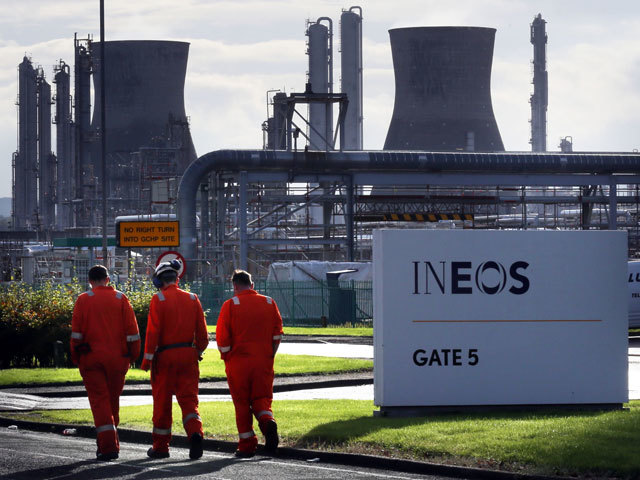
Union leaders slammed plans to cease operations at Grangemouth’s crude refinery and called for nationalisation, while just transition campaigners called for a ‘credible plan’ to protect workers.
Grangemouth refinery – Scotland’s last remaining crude refining capacity – could cease operations as soon as 2025, according to plans unveiled on Wednesday and branded “a kick in the teeth for the workforce and the community” by union leaders, who instead called for the site to be nationalised.
Operator Petroineos – a joint venture between PetroChina and Ineos – blamed market pressures and the energy transition for its decision to launch an 18-month ‘refinery transition project’ during which local refining would stop, with the site to instead become a fuels import terminal.
It’s understood that around 400 jobs could be lost as a result. About 500 people are currently directly employed at the facility.
In a statement the National Union of Rail, Maritime and Transport Workers (RMT) said the decision shows that governments in Westminster and Holyrood “have no interest in energy security, and also shows that both governments commitment to a Just Energy Transition for workers is non-existent”.
It noted that the closure of 100% of Scotland’s refining capacity and 25% of UK capacity would leave just three such assets across the country, and “makes no sense whatsoever.”
“The Offshore Branch has been warning for some time that energy security and a worker-led Just Energy Transition haven’t been taken seriously by the governments at Westminster and Holyrood. This action seems to confirm our fears,” it added.
“The Offshore Branch demands that both governments work together to take the Grangemouth Refinery into public hands and nationalise it, thus protecting national energy security and to show they are serious about a Just Energy Transition.”
Unite Scottish secretary Derek Thomson also said on Wednesday that “every option must be on the table” to secure the hundreds of based at the complex for the long-term.
‘Concern’ over just transition
Scotland’s Just Transition Commission – the group advising the Scottish government on a fair zero-carbon economy – also said it was “deeply concerned” by the announcement, which “runs directly counter to a just transition to a low carbon economy.”
“The Just Transition Commission is deeply concerned that we will see a repeat of previous unmanaged industrial transitions in coal and steel whose harmful effects are still felt by communities across the country. In this case there appears to have been minimal engagement with workers, the community or government ministers,” the group said in a statement.
It pressed the need to “urgently” understand what plans, if any, have been made to support a transition for workers impacted by the changes and called on Westminster and Holyrood to “engage fully and in good faith with workers and the community at Grangemouth and the surrounding area”.
In addition, it urged for the creation of “a credible just transition plan” that ensures employment levels and economic activity within the community are protected.
“Scotland’s approach to just transition planning has achieved international recognition. The future of those whose livelihoods are tied to Grangemouth will be critical in determining whether this aspiration is achieved.”
The commission noted that prior to the announcement made this week it had already agreed to visit Grangemouth early in 2024. Following this, it intends to publish findings and recommendations on next steps to support a just transition for the site.
Timeline yet to be determined
Petroineos Refining chief executive Franck Demay maintained yesterday it would be “business-as-usual” at the facility in the interim.
“As the energy transition gathers pace, this is a necessary step in adapting our business to reflect the decline in demand for the type of fuels we produce.”
Mr Demay said a precise timeline for any changes has yet to be determined and that the proposals represented “the start of a journey” to transform operations
“Throughout this process, our focus will remain on the safe production and reliable supply of high-quality fuels to our customers in Scotland, the north of England, and Northern Ireland.
“As we start to make this investment in preparing for a future transformation, we are equally committed to a regular programme of engagement with our colleagues about the changes we are making to our business.”
Recommended for you
